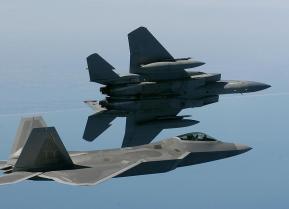VIDEO: What Happens if Washington, D.C. Was Attacked with a Nuclear Weapon
Could a terrorist group or nation-state clandestinely build and strike the United States with a nuclear weapon?
So, what could be the next “failure of imagination”?
The present national security environment America faces today is loaded with challenges as far as the eye can see—but it might just be the dangers we don’t see coming or fail to see, those that are so difficult to imagine, so gut wrenching and horrific to even contemplate, that a future calamity someday might take us by surprise and do the most harm of all.
(This first appeared in 2016.)
Consider the threats Washington faces today—anyone who casually reads the news can list them off with relative ease.
The rise of ISIS, now armed not with just lethal arms but ever more potent social media savvy, inspiring sinister plots the world over is an asymmetric threat not easy to counter.
(Recommended: How America Could Go to War with Iran)
Then there is Russia. Moscow continues to press NATO from the Baltics to the Black Sea and beyond, while its influence is on the rise in the Middle East with its unending military involvement in Syria. And the war in Ukraine continues to drag on. Asia most closely resembles a giant powder keg, ready to explode at any moment--thanks to North Korea.
With challenges in the East China Sea between China and Japan, Taiwan is now back in the news as President Xi tests Taipei’s elected leaders and the South China Sea seems set to boil.
(Recommended: Japan's Master Plan to Defeat China in a War)
But what challenges have we failed to see? What could be staring us in the face that is of an even more pressing concern beyond the conventional? Or, to phrase it a little differently, what former Secretary of Defense Donald Rumsfeld referred to as those threats our psyche just can’t comprehend—what he and others have called a “failure of imagination.”
(Recommended: Exposed: China's Super Strategy to Crush America in a War)
In a 2014 recent documentary about his life and times, Rumsfeld details this concept in an exchange with film maker Errol Morris when discussing Pearl Harbor:
DONALD RUMSFELD: We didn’t know we didn’t know that they [Japan] could do what they did the way they did it. We had people working on breaking codes. We had people thinking through, what are the kinds of things they might do? And, lo and behold, the carriers were able to — on a Sunday morning — get very close to Hawaii, launch their planes, and impose enormous destruction.
ERROL MORRIS: Was it failure of imagination, or failure to look at the intelligence that was available?
DONALD RUMSFELD: They had thought through a great many more obvious possibilities. People were chasing the wrong rabbit. That one possibility was not something that they had imagined was likely.
So today are we indeed “chasing the wrong rabbit”? If the events of Pearl Harbor and also 9/11 make clear, it’s the threats we don’t consider, the ones that take us by surprise, which could be the most earth shattering of all.
So, what could be the next “failure of imagination”?
The above video just might fit the bill. Could a terrorist group or nation-state clandestinely build and strike the United States with a nuclear weapon? Various scholars the world over have theorized as much, and watching the above video shows what a little imagination can do—with horrific results.
In the video, narrated by former Secretary of Defense William J. Perry, that possibility is certainly a very real one. While some of the details in the video seem a bit of a stretch, and it should be noted Perry’s politics are in the vein of banning all nuclear weapons, what I feel is an even bigger point, at least for me even if not intended, is clear—beware what seems almost unimaginable.
And to take this a little further, as Sam Roggeveen—hat tip to his post over at Lowy Interpreter—explains: “Politicians often talk loosely about terrorism as an 'existential threat', which is a vast overstatement — terrorists don't have the capability to undermine the character and essential functions of advanced nation-states. Unless those terrorists have nuclear weapons.”
While we all can certainly debate what is or isn’t a modern-day existential threat in its present form, we can all certainly agree terrorists and also lesser capable nation-states (consider impoverished North Korea, who has an economy smaller than Ethiopia, for example) are able to develop weapons that can cause America and her allies greater harm than ever before. Indeed, bearing in mind the first nuclear bomb went off decades \ ago, such a fact should give us pause, as nuclear but also chemical, biological and radiation based weapons could all be utilized to strike America in various types of ways by many different actors—an attack that would make 9/11 or Pearl Harbor seem small by comparison.
Unfortunately in the age we live, these are the facts, and not something we can simply fail to imagine.
Harry J. Kazianis is Director of Defense Studies at the Center for the National Interest and Executive Editor for The National Interest Magazine. You can follow him on Twitter: @Grecianformula.
Image: Reuters.


